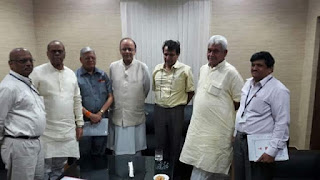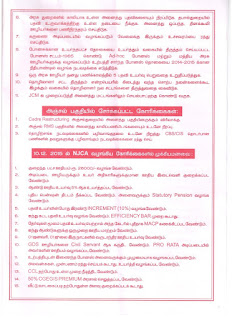1. The
present system of pay bands and grade pay has been dropped and a new
pay matrix as recommended by the commission has been approved. Separate
pay matrices have been drawn up for civilians, defence personnel and for
military nursing service.
By doing away with the
pay bands and grade pay, the new pay matrix ensures that there are no
abrupt jumps in salaries upon promotion in different pay bands.
2. All existing levels have been absorbed in the new structure; no new levels have been introduced.
3. The minimum pay has been increased from Rs 7,000 to Rs 18, 000 per month. Starting
salary of a newly recruited employee at lowest level will now be Rs
18,000 whereas for a freshly recruited Class I officer, it will be Rs
56,100.
4. For the purpose of revision of pay and pension, a fitment factor of 2.57 will be applied across all levels in the pay matrices. After
taking into account the DA at prevailing rate, the salary/pension of
all government employees/pensioners will be raised by at least 14.29 %
as on January 1, 2016.
5. Rate of increment has been retained at 3%.
This will benefit the employees in future on account of higher basic
pay as the annual increments that they earn in future will be 2.57 times
than at present.
6. The
Cabinet approved further improvements in the defence pay matrix by
enhancing Index of Rationalisation for Level 13A (Brigadier) and
providing for additional stages in Level 12A (Lieutenant Colonel), 13
(Colonel) and 13A (Brigadier) in order to bring parity with Combined
Armed Police Forces (CAPF) counterparts at the maximum of the respective
Levels.
7. Some other decisions impacting the employees including defence and Combined Armed Police Forces (CAPF) personnel include:
*Gratuity ceiling enhanced from Rs 10 to 20 lakh. The ceiling on gratuity will increase by 25% whenever DA rises by 50 %.
*A
common regime for payment of ex-gratia lump sum compensation for civil
and defence forces personnel payable to next of kin with the existing
rates enhanced from Rs 10-20 lakh to Rs 25-45 lakh for different
categories.
*Rates of military
service pay revised from Rs 1,000, Rs 2,000, Rs 4,200 and Rs 6,000 to Rs
3,600, Rs 5,200, Rs 10,800 and Rs 15,500 respectively for various
categories of defence forces personnel.
*Terminal gratuity
equivalent of 10.5 months of reckonable emoluments for Short Service
Commissioned Officers who will be allowed to exit armed forces any time
between seven and 10 years of service.
*Hospital
leave, special disability leave and sick leave absorbed into a
composite new leave named ‘Work Related Illness and Injury Leave’
(WRIIL). Full pay and allowances will be granted to all employees during
the entire period of hospitalisation on account of WRIIL.
8. The
Cabinet also approved the recommendation of the commission to enhance
the ceiling of House Building Advance from Rs 7.50 lakh to Rs 25 lakh. In
order to ensure that no hardship is caused to employees, four interest
free advances namely advances for medical treatment, travel allowance on
tour/transfer, TA for family of deceased employees and LTC have been
retained. All other interest free advances have been abolished.
9. The
Cabinet also decided not to accept the steep hike in monthly
contribution towards Central Government Employees Group Insurance Scheme
(CGEGIS) recommended by the commission. The
existing rates of monthly contribution will continue. This will
increase the take home salary of employees at lower levels by Rs 1,470. However,
considering the need for social security of employees, the Cabinet has
asked ministry of finance to work out a customised group insurance
scheme for central government employees with low premium and high risk
cover.
10. The
general recommendations of the commission on pension and related
benefits have been approved by the Cabinet. Both the options recommended
by the commission as regards pension revision have been accepted
subject to feasibility of their implementation. Revision of pension
using the second option based on fitment factor of 2.57 shall be
implemented immediately. A committee is being constituted to address the
implementation issues anticipated in the first formulation. The first
formulation may be made applicable if its implementation is found
feasible after examination by proposed committee which is to submit its
report within four months.
11. The
commission examined a total of 196 existing allowances and, by way of
rationalisation, recommended abolition of 51 allowances and subsuming of
37 allowances. Given the significant changes in the existing provisions
for allowances, which may have wide ranging implications, the
cabinet decided to constitute a committee headed by the finance
secretary for further examination of the recommendations of the pay
panel on allowances. The committee will submit its reports within four
months. Till a final decision, all existing allowances will continue to
be paid at the existing rates.
12. The
cabinet also decided to constitute two separate committees: (i) to
suggest measures for streamlining the implementation of National Pension
System (NPS) and (ii) to look into anomalies likely to arise out of
implementation of the commission’s report.
13. Apart
from the pay, pension and other recommendations approved by the
cabinet, it was decided that the concerned ministries may examine the
issues that are administrative in nature, individual post/ cadre
specific and issues in which the commission has not been able to arrive
at a consensus.
14. As
estimated by the pay panel, the additional financial impact on account
of implementation of all its recommendations in 2016-17 will be Rs
1,02,100 crore. There will be an additional implication of Rs 12,133
crore on account of payments of arrears of pay and pension for two
months of 2015-16.
15. Finance
minister Arun Jaitley said the National Democratic Alliance government
has taken the decision to implement the report of the 7th Pay Commission
much faster than in the past.
Source : The Hindustan Times

 July 02, 2016
July 02, 2016
 Kalaivaraikalai
Kalaivaraikalai


















